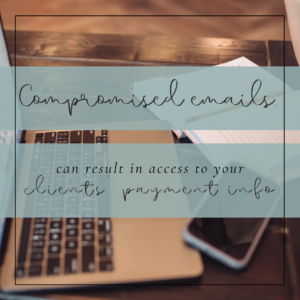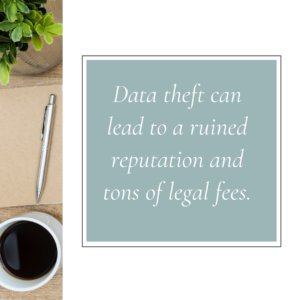
Being a bookkeeper is not for the faint of heart. It comes with a great deal of responsibility and meticulous attention-to-detail. Charged with the task of recording financial transactions, us bookkeepers have seen it all. And while numbers may seem boring to many (we know we are a unique pair at Two Sense Consulting), it is in this crunching of numbers that we find incredible ways to save businesses money, while also identifying inconsistencies and red flags that are costing businesses gravely. Read on to discover the 3 most common scams bookkeepers see that can harm your business’ finances, and of course, how to avoid them proactively.
Compromised emails can result in access to your clients’ payment info.
With the many benefits of technology making digital transactions virtually possible comes heightened security risks as well. Sophisticated hackers can gain unlawful access to your email or that of your staff. From there, they procure your contact lists, which typically include your clients and customers.
With your clients’ contact information, scammers will reach out masquerading as your organization, Then, they request payment, send invoices or similar. You’d think that many people would find such correspondence suspect, but the truth is that the majority of consumers are so personally (and literally) consumed by their own lifestyles and responsibilities that they tend to err on the side of quickly fixing outstanding payments and moving on. In fact, this past year alone, there was a 200 percent increase in Business Email Contact (BEC) attacks focused on invoice or payment fraud from April to May 2020!

What’s worse is that this isn’t just costing your customers or redirecting paid invoices to scammers versus your bottom line. But beyond that, once realized, customers and clients will lose trust in partnering with or promoting your organization due to their personal information being compromised. Even if you weren’t intentionally sharing it, the damage is done and trusting your business with personally identifiable information becomes obsolete.
This isn’t just for clients and customers with small invoice fees either. These can oftentimes be massive amounts of marketing budgets or other vendor-specific purchases that last-minute are redirected to the scammer’s pocket versus your business’ banking account. This has been found via a tactic where scammers hijack vendor conversations (again, once they’ve gained access to your company’s emails) to redirect vendor payments. These types of attacks typically involve much larger dollar amounts compared to other types of BEC attacks since they target business to business transactions.
As Virtual CFOs, we like to offer guidance on what to look for or to ask your team about in order to stay proactive in this area.
Look for suspicious signs or rare correspondence that implies something is off. For instance, if you are receiving strange messages from anyone in your contact list or if customers who regularly pay on time are late. This is where our accounting software comes in handy and once again, technology comes to the rescue. Consider using accounting software, or trusting Two Sense Consulting’s tools and expertise, to make it easier for customers and vendors to spot fake invoices or irregular dialogue.
Data theft can lead to a ruined reputation and tons of legal fees.
Similar to the above, more obvious issue of compromised payment information, is personally identifiable data itself. It isn’t just fake invoices and loss of funds that should concern you. Rather, the most critical information any customer or client trusts you with is their personal data like their social security numbers, password logins and banking details.
Cyber criminals use this data in various ways. Aside from the financial loss, a breach of data can result in reputational damage, operational downtime and legal action! Spending time and money to secure new business or reassure current clientele is extensive and expensive.
You’ll want to keep an eye out for suspicious links. Also, make sure you train your staff on what correspondence you authorize versus what you prohibit from them opening. Malware is defined as software that is specifically designed to disrupt, damage, or gain unauthorized access to a computer system. When you or your staff click these links in emails, malware snakes its way through data. Then, it reports it all back to the scammer.

Want to know one of the best ways yo
u can avoid this 1 of the 3 most common scams bookkeepers see that can affect a business’ finances?
Establish company best practices around cybersecurity, including what employees should do if they receive a suspicious email or start noticing suspicious charges. Better yet, hire one of us at Two Sense Consulting to come in and set up best practices. We will train your staff on how to avoid and also report these scams.
Hackers have become increasingly clever. They’ve ditched the outlandish Nigerian Prince scam emails. Now, they opt for much more realistic and seemingly credible content. As a matter of fact, many scammers will use exact correspondence with the slightest changes that go easily unnoticed. For example, an email address that matches your company’s but ends with .net versus .com. Within that same, almost identical email, are payment links that redirects their purchases to a different URL.
Executive imposter scams target your accountants directly.
These types of fraud tend to surface in the form of someone emailing your accountant (internal or external). It also could be emailing another employee at your company impersonating you or another high-level executive in your business. In all actuality, the sender is an imposter. Usually, these emails request a money transfer to a specified account.
You’ll want to trust that your accountant is competent enough to look out for these invoice scams. Double-checking the sender’s email address and always confirming payment information matches what you have on file is a must.
One of the easiest ways you can avoid these 3 most common scams bookkeepers see that can affect a business’ finances is to hire Virtual CFOs or Bookkeepers you can trust.
You may already have an accountant on-hand whom you trust and can, of course, make the occasional mistake. But, you’ll still ultimately be responsible for their actions – and inactions – when scams like this come to full fruition.
Institute a verification process at your company or bring us at Two Sense Consulting onboard instead! We will create and implement this on your behalf. This looks like educating employees on practices to follow when it comes to payment processing. Because change can be tedious but necessary, we offer Change and Project Management as well.
The pains of change can have a significant and long term impact. You must manage each stage carefully. And everyone needs to be on the same page, operating as optimally as you would in your absence. Planning must be thorough to build trust, expertise, and energy, which will keep these policies and protective measures on track. When we look at organizational restructuring, it comes in many forms. We can create a system for how your employees or staff report these types of suspicious activity.
Hire experts to manage your accounting virtually with a keen eye and regular reporting.
If ever in doubt, Two Sense Consulting has clout. We have worked with businesses and their financial records for decades! We know the way to growth is by using analytical and financial data to create a roadmap, as well as to avoid financial pitfalls like the scams detailed above. Two Sense Consulting helps companies like yours analyze the past and present. This way, you can build a healthy future with less risk and more revenue. Call us today for a free consultation – and that is no scam!






